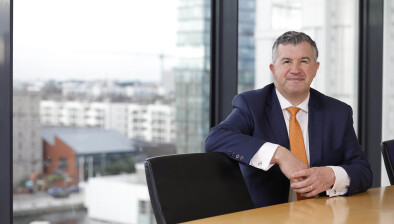Supreme Court: Former bank executive loses appeal against conviction for conspiracy to defraud
The former chief executive of Irish Life & Permanent, who was found guilty of conspiracy to defraud, has lost an appeal against his conviction.

About this case:
- Citation:[2019] IESC 7
- Judgment:
- Court:Supreme Court
- Judge:Mr Justice Peter Charleton
Explaining the parameters of the defence of “officially induced error”, Mr Justice Peter Charleton found nothing in the evidence to support an argument that the €7.2 billion in fraudulent transactions were officially sanctioned, and held that the trial judge was correct to rule out any mention of the defence before the jury.
Background
In June 2016, former Chief Executive of Irish Life & Permanent, Mr Denis Casey, was convicted by a jury at Dublin Circuit Criminal Court of conspiracy to defraud. He was sentenced to two years and nine months imprisonment.
The charge was that between March and September 2008, Mr Casey had conspired with others to defraud by engaging in transactions between Anglo Irish Bank Corporation, Irish Life & Permanent, and Irish Life Assurance dishonestly to create the false and misleading impression that deposits from a non-bank entity to Anglo Irish Bank were approximately €7.2 billion larger than they really were, with the intention of inducing existing and prospective depositors with, existing and prospective investors in, and existing or prospective lenders to Anglo Irish Bank to make decisions concerning their deposits or investments in, or loans to the Bank on the assumption that it received larger deposits from a non-Bank entity than it really did.
The €7.2 billion was that bank’s own money routed through Irish Life Assurance and Irish Life & Permanent plc so as to appear as a deposit from an outside source.
At trial, Mr Casey raised numerous defences challenging any contention that the content and presentation of the accounts was at all misleading. Among his answers to the charge was that he had official authorisation for this form of misleading accounting.
He argued that, at the time in question, there was a strategy of mutual support by Irish Banks in order to support national interests – the “green jersey agenda”. Mr Casey submitted that in a conversation with the Financial Regulator in March 2008, this agenda had been pointed out and he took it to mean that it was necessary to present balance sheets in a way that downplayed matters of concern to the Financial Regulator.
It was noted that there was nothing in the report of this conversation which could possibly provide official sanction for the transactions in question.
In the Court of Appeal in June 2017, Mr Casey’s multiple grounds of appeal were refused by Mr Justice Sean Ryan, former President of the Court of Appeal.
Officially Induced Error
The Supreme Court certified the following as a point of general public importance:
“Whether the defence of “officially induced error” or “entrapment by estoppel” is available in this jurisdiction and, if so, what its parameters are and whether it was open to the applicant on the evidence in this case”.
At trial, Judge Martin Nolan had ruled that “officially induced error” did not arise in this case, and citing the leading American cases on “entrapment by estoppel”, Mr Justice Peter Charleton was satisfied that, in practice, the proposed defences were indistinguishable from each other.
Mr Justice Charleton said that “officially induced error’ was available in this jurisdiction, and explained that it was an exception to the rule that ignorance of the law, or mistake as to the law, cannot excuse criminal conduct.
He said that for “officially induced error” to be accepted as to bar the continuation of a criminal prosecution, the accused must prove that he or she went in good faith to seek legal advice from the authority that a reasonable person would see as possessing ostensible authority to advise on whether a proposed course of conduct was or was not lawful.
In seeking advice, Mr Justice Charleton said it would not be enough that an accused give a vague outline to that authority of what he or she proposes. Instead, the proposal about which legal advice is sought must be specific, describing accurately that conduct which is the subject matter of the later criminal charge. What the official advises must be specific and must amount to legal advice, or advice of mixed law and fact, in a manner which clearly and unequivocally authorises the conduct as a matter of law.
It is not sufficient for the advice to be such as to reasonably put the accused on notice to make further enquiries. The advice must cover the situation in issue. That advice must be accepted honestly by the accused and must be such that a reasonable person would be likely to act on it. It follows that in the commission of the offence, there must be no deviation from the apparently authorised conduct. To raise the defence, the accused must precisely describe before the trial judge what he or she did rather than evading responsibility through not admitting conduct.
Officially induced error is not a justificatory or excusatory defence in criminal law: rather, it amounts to a legal objection to the continuation of the criminal process, is rooted in Article 34.1 and Article 38.1 of the Constitution, and founded on justice and due process.
Mr Justice Charleton said “notice in writing of both the nature of the answer to an offence charged and how it is claimed to be applicable is part of the proper administration of justice in this regard”, and proof of elements of unfairness must be established by the accused on the balance of probabilities.
Mr Justice Charleton said it was for the trial judge to decide the “applicability of the plea in demur”, whether the accused met the burden of proof on the facts, and whether the legal exception was applicable. In those circumstances and considering the evidence, Mr Justice Charleton was satisfied that the plea to demur prosecution was not open to Mr Casey, and there was nothing before the trial judge to enable the defence of “officially induced error” to succeed.
Finding that the trial judge was “correct in ruling out any mention” of this proposed defence before the jury, and that the Court of Appeal was correct to dismiss the appeal, Mr Justice Charleton said that the conviction should stand.
- by Seosamh Gráinséir for Irish Legal News








